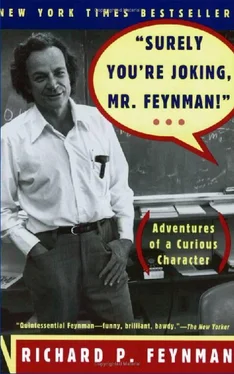I used to cut vegetables in the kitchen. String beans had to be cut into one-inch pieces. The way you were supposed to do it was: You hold two beans in one hand, the knife in the other, and you press the knife against the beans and your thumb, almost cutting yourself. It was a slow process. So I put my mind to it, and I got a pretty good idea. I sat down at the wooden table outside the kitchen, put a bowl in my lap, and stuck a very sharp knife into the table at a forty-five-degree angle away from me. Then I put a pile of the string beans on each side, and I’d pick out a bean, one in each hand, and bring it towards me with enough speed that it would slice, and the pieces would slide into the bowl that was in my lap.
So I’m slicing beans one after the other— chig, chig, chig, chig, chig —and everybody’s giving me the beans, and I’m going like sixty when the boss comes by and says, “What are you doing? ”
I say, “Look at the way I have of cutting beans!”—and just at that moment I put a finger through instead of a bean. Blood came out and went on the beans, and there was a big excitement: “Look at how many beans you spoiled! What a stupid way to do things!” and so on. So I was never able to make any improvement, which would have been easy—with a guard, or something—but no, there was no chance for improvement.
I had another invention, which had a similar difficulty. We had to slice potatoes after they’d been cooked, for some kind of potato salad. They were sticky and wet, and difficult to handle. I thought of a whole lot of knives, parallel in a rack, coming down and slicing the whole thing. I thought about this a long time, and finally I got the idea of wires in a rack.
So I went to the five-and-ten to buy some knives or wires, and saw exactly the gadget I wanted: it was for slicing eggs. The next time the potatoes came out I got my little egg-slicer out and sliced all the potatoes in no time, and sent them back to the chef. The chef was a German, a great big guy who was King of the Kitchen, and he came storming out, blood vessels sticking out of his neck, livid red. “What’s the matter with the potatoes?” he says. “They’re not sliced!”
I had them sliced, but they were all stuck together. He says, “How can I separate them?”
“Stick ’em in water,” I suggest.
“IN WATER? EAGHHHHHHHHHHH!!!”
Another time I had a really good idea. When I was desk clerk I had to answer the telephone. When a call came in, something buzzed, and a flap came down on the switchboard so you could tell which line it was. Sometimes, when I was helping the women with the bridge tables or sitting on the front porch in the middle of the afternoon (when there were very few calls), I’d be some distance from the switchboard when suddenly it would go. I’d come running to catch it, but the way the desk was made, in order to get to the switchboard you had to go quite a distance further down, then around, in behind, and then back up to see where the call was coming from—it took extra time.
So I got a good idea. I tied threads to the flaps on the switchboard, and strung them over the top of the desk and then down, and at the end of each thread I tied a little piece of paper. Then I put the telephone talking piece up on top of the desk, so I could reach it from the front. Now, when a call came, I could tell which flap was down by which piece of paper was up, so I could answer the phone appropriately, from the front, to save time. Of course I still had to go around back to switch it in, but at least I was answering it. I’d say, “Just a moment,” and then go around to switch it in.
I thought that was perfect, but the boss came by one day, and she wanted to answer the phone, and she couldn’t figure it out—too complicated. “What are all these papers doing? Why is the telephone on this side? Why don’t you … raaaaaaaa! ”
I tried to explain—it was my own aunt—that there was no reason not to do that, but you can’t say that to anybody who’s smart, who runsa hotel! I learned there that innovation is a very difficult thing in the real world.
At MIT the different fraternities all had “smokers” where they tried to get the new freshmen to be their pledges, and the summer before I went to MIT I was invited to a meeting in New York of Phi Beta Delta, a Jewish fraternity. In those days, if you were Jewish or brought up in a Jewish family, you didn’t have a chance in any other fraternity. Nobody else would look at you. I wasn’t particularly looking to be with other Jews, and the guys from the Phi Beta Delta fraternity didn’t care how Jewish I was—in fact, I didn’t believe anything about that stuff, and was certainly not in any way religious. Anyway, some guys from the fraternity asked me some questions and gave me a little bit of advice—that I ought to take the first-year calculus exam so I wouldn’t have to take the course—which turned out to be good advice. I liked the fellas who came down to New York from the fraternity, and the two guys who talked me into it, I later became their roommate.
There was another Jewish fraternity at MIT, called “SAM,” and their idea was to give me a ride up to Boston and I could stay with them. I accepted the ride, and stayed upstairs in one of the rooms that first night.
The next morning I looked out the window and saw the two guys from the other fraternity (that I met in New York) walking up the steps. Some guys from the Sigma Alpha Mu ran out to talk to them and there was a big discussion.
I yelled out the window, “Hey, I’m supposed to be with those guys!” and I rushed out of the fraternity without realizing that they were all operating, competing for my pledge. I didn’t have any feelings of gratitude for the ride, or anything.
The Phi Beta Delta fraternity had almost collapsed the year before, because there were two different cliques that had split the fraternity in half. There was a group of socialite characters, who liked to have dances and fool around in their cars afterwards, and so on, and there was a group of guys who did nothing but study, and never went to the dances.
Just before I came to the fraternity they had had a big meeting and had made an important compromise. They were going to get together and help each other out. Everyone had to have a grade level of at least such-and-such. If they were sliding behind, the guys who studied all the time would teach them and help them do their work. On the other side, everybody had to go to every dance. If a guy didn’t know how to get a date, the other guys would get him a date. If the guy didn’t know how to dance, they’d teach him to dance. One group was teaching the other how to think, while the other guys were teaching them how to be social.
That was just right for me, because I was not very good socially. I was so timid that when I had to take the mail out and walk past some seniors sitting on the steps with some girls, I was petrified: I didn’t know how to walk past them! And it didn’t help any when a girl would say, “Oh, he’s cute!”
It was only a little while after that the sophomores brought their girlfriends and their girlfriends’ friends over to teach us to dance. Much later, one of the guys taught me how to drive his car. They worked very hard to get us intellectual characters to socialize and be more relaxed, and vice versa. It was a good balancing out.
I had some difficulty understanding what exactly it meant to be “social.” Soon after these social guys had taught me how to meet girls, I saw a nice waitress in a restaurant where I was eating by myself one day. With great effort I finally got up enough nerve to ask her to be my date at the next fraternity dance, and she said yes.
Читать дальше












